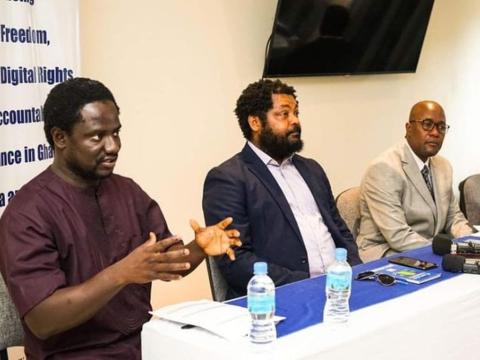By Nasratu Kargbo
In a bid to sanitize the journalism profession and ensure that selfless service is paramount in the execution of the trade, the President of the Sierra Leone Association of Journalists (SLAJ) Ahmed Sahid Nasralla has called on journalists to seek public interest to ensure national development.
Speaking during the launch of a manual for journalists on the Right to Access Information Act, Nasralla advised participants to hold the government accountable and ensure that services are provided for the citizens. He emphasized that the journalists' mission should not be to promote politicians or corporations, but rather the interests of the people.
He said the profession can only be respected and trusted if journalists ensure that they are there to speak for the people, impact their lives and write stories that influence change, and ensure that basic amenities are provided.
Speaking on the essence of investigative reporting, he said that it is a form of journalism that is very vital to ensuring that leaders are investigated and held to account, and also noted its relevance in the fight against corruption in order to serve the public’s interest.
Nasralla explained that leaders can only be investigated and brought to book if the journalist gets access to information to facilitate their job. He stated that it is in that spirit that SLAJ has been advocating that the RAIC is strengthened, in order for the journalists to use the law through the commission to facilitate their work.
Delivering his keynote address, the Minister of Information and Communications Mohamed Rahman Swaray explained that the paper on regulations for the RAIC has been laid in parliament, and mentioned that it is to ensure that they create the enabling environment for not just journalists, but also citizens who may wish to hold the government to account, or want to understand situations around service delivery in their community, to be able to access information and on time.
He spoke about fake news which he said can only thrive and triumph in a society where people do not have access to correct information.
The minister stated that he went through the manual and one of the things he picked up was the step-by-step procedure of how journalists or citizens can go about requesting information they might need. He noted it is a big problem, emphasizing that people do not know how to use the power in their hands to access information.
Swaray expressed gratification for such training and explained an experience where some had demanded information in a rude manner. He noted that the training was timely, especially in an era where access to information is becoming a human rights issue.
The Chairman of the Right to Access Information Commission (RAIC) Dr. Ibrahim Sheaga Shaw mentioned two approaches, referring to one as the babysitting approach and the other enforcing compliance approach.
He explained that the babysitting approach is where they support demand and supply of information, explaining that the demand aspect is when journalists and members of the public request information.
Whilst supply is when MDAs and other institutions proactively disclose and make information available to the public via online, public notices, etc. without being asked. The Act makes it obligatory for public authorities to provide access to information when it is needed.
Shaw stated that the second approach which is enforcing compliance is only applied when the first fails. He noted that this is when the commission forces the offices that have refused to give the information needed, to do so.
He spoke on the regulations, and their relevance to the work. The Chairman noted that the Act is a bit skeletal, though the regulation encompasses the details needed to support the Act.
Media Foundation for West Africa’s Project Coordinator Adizatu Moro Maiga noted that access to information is now a tool for development and accountability.
She explained that they have tried simplifying the RAI laws in different countries in order for citizens to be educated on their right to know that they can ask for information when they want to.
The programme which was organized by MFWA in partnership with the Media Reform Coordinating Group (MRCG) was climaxed by the launch of a manual, followed by a one-day training for journalists on investigative and anti-corruption reporting.








